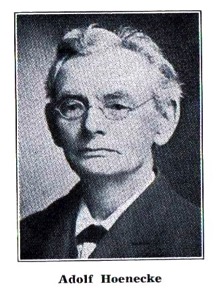Archive for November 2015
A Prayer for the 4th of July
TO READ IN BOOK FORMAT, OR TO PRINT THIS ARTICLE, CLICK ON THIS LINK – 5-A-Prayer-for-the-4th-of-July.-pdf Dear heavenly God, true and triune: At the approach of the Fourth of July, the day on which our Continental Congress formally signed the Declaration of Independence, make our souls surge upward to you in thanks for your divine…
Read MoreAn All-important Lesson: How to prepare for Death.
TO READ IN BOOK FORMAT, OR TO PRINT THIS ARTICLE, CLICK ON THIS LINK – 8-An-All-important-Lesson- From Luther by the Reverend H. W. Wehrs “I. Because death is a departure from the world and all its affairs, it is necessary for a man to make arrangement for his money and property in order to remove…
Read MoreWhy the abrupt Death of Walter A. Maier?
TO READ IN BOOK FORMAT, OR TO PRINT THIS ARTICLE, CLICK ON THIS LINK – Why the abrupt Death of Walter A. Maier? “Behold, a man of God went from Judah to Bethel by the word of the Lord…. “Now an old prophet dwelt in Bethel, and his sons came and told him all the…
Read MoreAdolf Hoenecke, WELS, and the Ministry
In the English translation of Adolf Hoenecke’s Dogmatics one of the three translators made this remark at the beginning of the section on the doctrine of the ministry: “The doctrine of the ministry was the focus of intensive study within the Wisconsin synod after Hoenecke’s time. Some of the most important studies are in the…
Read MoreThe Importance of possessing a Guilty Conscience
TO READ IN BOOK FORMAT, OR TO PRINT THIS ARTICLE, CLICK ON THIS LINK – 13-The-Importance-of-possessing-a-guilty- Psalm 51:10-12: “Create in me a clean heart, O God, and renew a steadfast spirit within me! Do not cast me away from your presence, and do not take your Holy Spirit from me! Restore to me the joy…
Read MoreA Sermon in Memory of Paul Edward Kretzmann
TO READ IN BOOK FORMAT, OR TO PRINT THIS ARTICL, CLICK ON THIS LINK – 14-A-Sermon-in-memory-of-P-E-Kretzmann Psalm 112:6: The righteous will be in everlasting remembrance. Following Scripture, a genuine Lutheran congregation will not give extraordinary exaltation to its departed members by eulogizing them at their funerals, for instance, or much worse, by praying to them…
Read MoreA Fourth of July Sermon
TO READ IN BOOK FORMAT, OR TO PRINT THIS ARTICLE, CLICK ON THIS LINK – 15-A-4th-of-july-Sermon- Jeremiah 29:7: Seek the peace of the city where I have caused you to be carried away captive, and pray to the Lord for it; for in its peace you will have peace! Until rather late in the history of…
Read MoreThe Lord defends a powerless Nation
TO READ IN BOOK FORMAT, OR TO PRINT THIS ARTICLE, CLICK ON THIS LINK – 16-The-Lord-defends-a-powerless-Nation-Jehosaphat 2nd Chronicles 19:4-20:32 About nine hundred years before the birth at Bethlehem of Jesus Christ, mankind’s Savior and God, there lived a king by the name of Jehoshaphat. His capital was Jerusalem. Spiritually, he was a believer in the…
Read MoreWhy would You need the Gospel?
TO READ IN BOOK FORMAT, OR TO PRINT THIS ARTICLE, CLICK O N THIS LINK – 17-Why-would-you-need-the-gospel At the beginning of creation God had created man and woman pure and holy for the purpose of having them live with him in heaven. To this end God created this world for man to live in temporarily, in…
Read MoreWhat does It mean to Repent and to Believe!
TO READ IN BOOK FORMAT, OR TO PRINT THIS ARTICLE, CLICK ON THIS LINK – 18-What-does-it-mean-to-Repent-and-believe What does it mean “to repent”? It means to have a change of mind about sin. By nature man does not consider the awful damnableness of his life. He flatters himself into thinking that he lives a well-behaved life as…
Read More